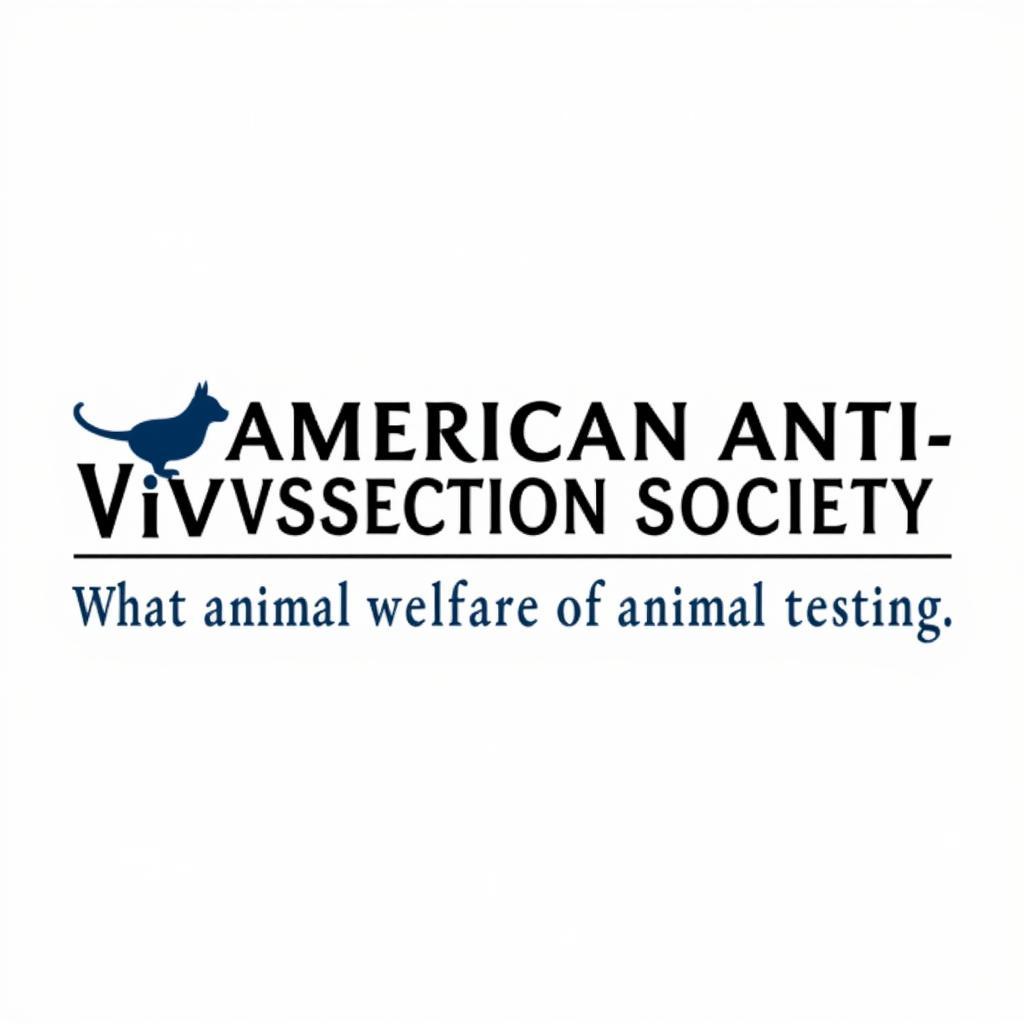The American Anti-Vivisection Society (AAVS) is a crucial organization in the fight against animal testing. It advocates for alternatives to animal experimentation and promotes compassionate treatment of animals in research. This article explores the AAVS, its mission, and its impact on the scientific community.
What is the American Anti-Vivisection Society?
The AAVS is one of the oldest and most respected animal advocacy groups in the United States. Founded in 1929, it has consistently championed the rights of animals used in research, testing, and education. The society believes that animal experimentation is not only cruel but also scientifically flawed, advocating for more humane and effective research methods. The American Anti-Vivisection Society’s core belief is that animals deserve to live free from suffering inflicted by humans, especially in the name of science.
 AAVS logo
AAVS logo
The AAVS’s Mission and Impact
The AAVS’s mission is multifaceted. They strive to eliminate animal suffering in laboratories by promoting research methods that don’t involve animals. They actively lobby for legislation that restricts or bans animal testing and fund research into alternatives. The American Anti-Vivisection Society also educates the public about the realities of animal experimentation and the availability of alternative methods. Their efforts have led to significant advancements in the development and acceptance of non-animal research techniques.
The AAVS has played a vital role in raising awareness about the ethical and scientific concerns surrounding animal testing. Their work has influenced public opinion, leading to increased pressure on researchers and regulatory bodies to consider alternatives. The society’s influence has helped shift the scientific landscape towards more humane and scientifically sound practices.
How Does the American Anti-Vivisection Society Work?
The AAVS utilizes various strategies to achieve its goals. They conduct scientific research, publish reports, and organize campaigns to educate the public and policymakers about the harms of animal testing. They also provide grants to scientists developing non-animal research methods and work collaboratively with other animal welfare organizations. The American Anti-Vivisection Society engages in legal advocacy, challenging regulations that permit animal testing and supporting legislation that protects animals.
What are the alternatives to animal testing promoted by the AAVS?
The AAVS actively promotes several alternatives to animal testing, including in vitro methods (using cell cultures and tissues), in silico methods (computer modeling and simulations), and human-based research (using human volunteers and epidemiological studies). These methods offer more ethical and often more accurate ways to conduct scientific research. The American Anti-Vivisection Society emphasizes the scientific validity and ethical superiority of these alternatives, driving the transition towards a more humane and progressive scientific community.
Conclusion
The American Anti-Vivisection Society continues to be a leading force in the fight against animal testing. Their unwavering commitment to animal welfare and their advocacy for scientifically sound alternatives have made a significant impact on the scientific community. By promoting ethical research practices, the American Anti-Vivisection Society contributes to a more compassionate and scientifically advanced future.
FAQ
- What is vivisection? Vivisection refers to the practice of performing operations on live animals for scientific research.
- Is the AAVS a vegan organization? The AAVS focuses specifically on ending animal experimentation, but they do support and promote a cruelty-free lifestyle.
- How can I support the AAVS? You can support the AAVS through donations, volunteering, and spreading awareness about their work.
- What are some of the AAVS’s major accomplishments? The AAVS has been instrumental in the passage of several laws protecting animals used in research and has funded numerous research projects on alternatives to animal testing.
- Does the AAVS work internationally? While primarily focused on the United States, the AAVS collaborates with international organizations on global animal welfare issues.
- How does animal testing impact human health? Animal testing can be misleading due to species differences and may delay the development of safe and effective treatments for humans.
- What is the future of animal testing? With increasing awareness and the development of more sophisticated alternatives, the future of animal testing is hopefully one of phasing it out completely.
When you need support, please contact Phone Number: 02043854663, Email: [email protected] Or visit us at: Khu 34, Bac Giang, 260000, Vietnam. We have a 24/7 customer service team.